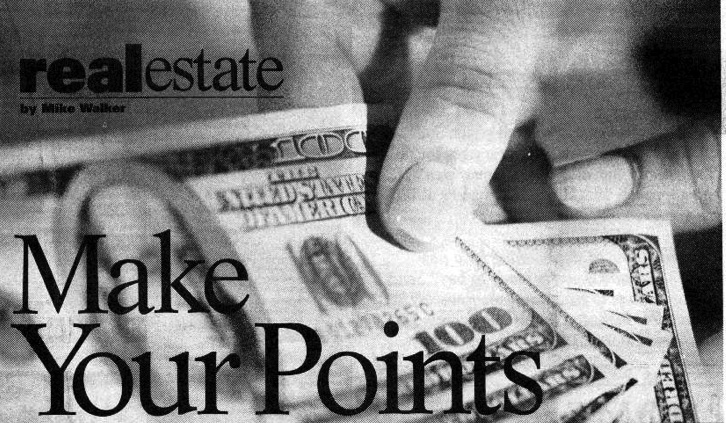Last week I discussed the second-favorite topic of
conversation at any Washington, D.C. party - mortgages. This week, I'll
cover an issue that is clearly number one and that keeps every party going
on and on. Naturally, the topic I'm referring to is ... points.
Face it, When you decide to buy a home you'll be facing a
large loan - called a mortgage. The lender will offer an array of programs
for you to choose from, consisting of differing payment plans, interest
rates and pay-off terms. The program you choose will probably involve the
payment of "points."
Points are up-front fees that you pay to the folks who lend
you the money. Each point, equal to one percent of the loan amount, is
simply pre-paid interest the bank or mortgage company charges. These charges
re paid at the time of closing, which is that magical moment when ownership
of the property transfers from the seller to you. As an example, one point
on a $200,000 loan would be $2,000.
When you pay points at closing, the lender reduces the
interest rate charged on the loan. As a result, your future monthly payments
will be less. This concept can be a good thing or a bad thing, depending
upon your financial situation.
Obviously., the good thing is that the more points you pay,
the lower interest rate you'll be able too get. The downside is that points
equal cash - and you'll need more green- backs at the time of closing to pay
for them. Keep in mind. however, that during the process when you and the
seller are trying to agree on a sale price for your dream home, you can use
points as a bai-gaining tool. In exchange for a slightly higher sale price,
you can suggest to the seller (with a mischievous smile on your face) that
she or he pay some of your points for you at closing.
Doesn't that sound great? And to sweeten the pie, add this
tasty morsel to the recipe: the money you pay for points at closing is
tax-deductible. This means that when you pay a point, you can write it off
your taxes that same year (but please check with an accountant, because each
personal situation may vary slightly and there could be limits to your
deductions). The tax benefit of points is one reason real property sales
surge near year's end - people are attempting to take last-minute advantage
of the points deduction.
Now, I realize this is an oversimplification of the overall
process. For instance, points come in a few different varieties. There are
loan origination fees (or points), which are fees the mortgage company can
charge to process and approve your loan; and there are discount points,
which can be used to reduce the rate of the interest you'll have to pay.
These complexities are a bit broader than the scope of this column and
highlight the advisability of getting professional assistance purchasing a
home.
Remember, mathematically speaking, you could recoup any
money you pay for points upfront through the savings gained by a lower
monthly payment. The time frame to fully recoup depends on how many points
you have paid up front and how long you keep the loan. Most people can
easily calculate whether the payment of points saves money over the period
they plan to keep the loan - provided they have a calculator, scratch paper,
and nerves of steel. I, however, let my realtor do the math for me; and hey
- guess what? He came through with flying colors and I ultimately saved a
bundle.
